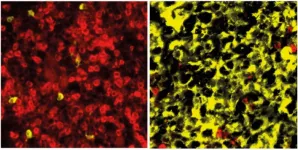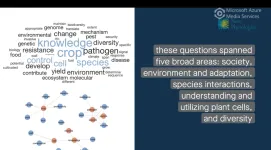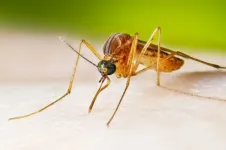(Press-News.org)
Photos
There's been a well-documented shift toward earlier springtime flowering in many plants as the world warms. The trend alarms biologists because it has the potential to disrupt carefully choreographed interactions between plants and the creatures—butterflies, bees, birds, bats and others—that pollinate them.
But much less attention has been paid to changes in other floral traits, such as flower size, that can also affect plant-pollinator interactions, at a time when many insect pollinators are in global decline.
In a study published online in the journal Evolution Letters, two University of Michigan biologists and a University of Georgia colleague show that wild populations of the common morning glory in the southeastern United States increased the size of their flowers between 2003 and 2012.
Increased flower size suggests a greater investment by the plants in pollinator attraction, according to the researchers. The changes were most pronounced at more northern latitudes, in line with a broad range of previous work showing that northern plant populations tend to show more dramatic evolutionary responses to climate change.
A shift to earlier flowering was also observed among those morning glory populations. In addition, there were tantalizing indications that the plants have increased their investment in floral rewards—the nectar and pollen obtained by the bees, syrphid flies and wasps that pollinate the white, pink and blue morning glory flowers.
"There is a major gap in our understanding of how traits that are crucial for plant-pollinator interactions may be evolving over time as a response to a changing climate," said study lead author Sasha Bishop, a doctoral student in the U-M Department of Ecology and Evolutionary Biology.
"We show that—in addition to well-documented shifts to earlier flowering—floral architecture and rewards can also play significant roles in the evolutionary response to contemporary environmental change."
The common morning glory is an annual weedy vine found across the eastern, midwestern and southern United States. It is frequently seen along roadsides and crop fields.
The U-M-led study used a "resurrection" approach that involved germinating morning glory seeds collected from the edges of agricultural soy and corn fields in Tennessee, North Carolina and South Carolina in two years: 2003 and 2012.
During that nine-year span, the region experienced rising temperatures—particularly rising minimum and nighttime temperatures—and an increase in the number of extreme rainfall events interspersed with more extreme drought.
To look for changes in floral morphology, the researchers planted field-collected seeds from both years in a greenhouse at U-M's Matthaei Botanical Gardens. When the flowers bloomed, various floral traits were measured with digital calipers.
Measurements showed that morning glory corollas became significantly wider during the nine-year interval—4.5 centimeters (1.8 inches) in diameter in 2003 and 4.8 centimeters (1.9 inches) in 2012, and the change in corolla width was greatest in populations at more northern latitudes. The petals of a flower are collectively known as the corolla.
The study also revealed a shift to earlier flowering times between 2003 and 2012, driven primarily by populations at more northern latitudes. The start of flowering occurred an average of four days earlier for the plants grown from seeds collected in 2012.
Interestingly, the researchers also observed a latitude-influenced trend toward greater investment in floral rewards (pollen and nectar) over time. On average, morning glory flowers grown from 2012-collected seeds produced more pollen grains and more nectar sucrose than the flowers from the 2003-collected seeds.
However, the pollen and nectar analyses involved only four populations of morning glory plants. Due to the low number of populations examined, the floral rewards findings were not included in a statistical test to look for evidence that adaptation through natural selection is occurring in the plants.
"Nonetheless, it appears likely that there is a temporal increase in investment in pollinator attraction and that this result is driven by populations at northern latitudes," said study senior author Regina Baucom, an associate professor in the U-M Department of Ecology and Evolutionary Biology.
The study found no evidence that morning glories are increasing the rate at which they self-pollinate. Evidence from some previous studies pointed to increased "selfing" as a possible response to climate change and/or pollinator declines associated with land-use change.
"This is the first article to use the resurrection approach to examine the potential that traits responsible for plant-pollinator interactions may be evolving over time, concomitant to decreases in pollinator abundance and dramatic environmental changes due to changing climate and land-use regimes," Bishop said.
Fifteen morning glory populations were included in the resurrection experiment looking at changes in floral morphology. Twenty-three populations were included in the study of earlier springtime flowering. In total, 2,836 flowers were measured from 456 plants.
The other author of the Evolution Letters study is Shu-Mei Chang of the University of Georgia. The work was supported by a grant from the U.S. Department of Agriculture and by graduate research funds from the U-M Department of Ecology and Evolutionary Biology.
Study: Not just flowering time: a resurrection approach shows floral attraction traits are changing over time
END
Bigger flowers, greater rewards: Plants adapt to climate disruptions to lure pollinators
2023-03-16
ELSE PRESS RELEASES FROM THIS DATE:
Novel disease models for multiple myeloma
2023-03-16
B lymphocytes – also known simply as B cells – play a central role in the immune system. If pathogens enter the body, B cells are activated and develop into plasma cells, which then release antibodies. One important step in this process is the germinal center reaction. If the B cells’ maturation into plasma cells is disrupted, multiple myeloma can develop – one of the most common blood cancers. This disease has a variety of subtypes and is not yet curable.
Multiple myelomas develop very slowly and in several stages. The process is initiated by spontaneous genetic aberrations that occur ...
Scientists identify 100 important questions facing plant science
2023-03-16
What are the key research priorities that will help tackle the global challenges of climate change, the biodiversity crises and feed a growing population in a sustainable way? Ten years after these priorities were first debated and summarised by a panel of scientists and published in New Phytologist, the panel reflects on the changes to plant science and the progress made to address these research areas, published on 16 March in a Letter in New Phytologist.
To re-evaluate research priorities, a new panel was formed in 2022 to provide an international perspective on the important areas for plant science research. This project, ...
Clinical trial investigating innovative way to control Type 2 diabetes
2023-03-16
LOS ANGELES — More than 37 million Americans have diabetes, and approximately 90-95% have Type 2 diabetes.
Diabetes is a chronic condition where the body does not produce or effectively use insulin. A lack of insulin leads to raised blood glucose (sugar) levels, which can cause heart disease and stroke, kidney disease, nerve damage and other severe complications.
Keck Medicine of USC has launched a Phase 2 clinical trial investigating the effectiveness of a new outpatient, nonsurgical endoscopic procedure in stabilizing blood glucose levels for patients.
“Currently, the only treatment for diabetes ...
Humans bite back by deactivating mosquito sperm
2023-03-16
New UC Riverside research makes it likely that proteins responsible for activating mosquito sperm can be shut down, preventing them from swimming to or fertilizing eggs.
The study could help control populations of Culex, the common house mosquito that transmits brain-swelling encephalitis and West Nile Virus.
“During mating, mosquitoes couple tail to tail, and the males transfer sperm into the female reproductive tract. It can be stored there awhile, but it still has to get from point A to point B to complete fertilization,” said Cathy Thaler, UCR cell biologist and the study’s first author.
Key to completing that journey are the specialized proteins secreted ...
New findings published in AJIC highlight clinician perspectives on barriers to reliable hand hygiene
2023-03-16
Arlington, Va., March 16, 2023 – Findings from a new study published in the American Journal of Infection Control (AJIC), highlight perceptions of and barriers to reliable hand hygiene among specific clinician subgroups. The results, from the first study of its kind, provide insights that can be used to design and implement future, targeted interventions to optimize hand hygiene reliability among medical professionals.
“While prior studies focused on challenges to hand hygiene reliability by healthcare role, we believe our study is the first to highlight key differences in perceived barriers ...
Common meat-free proteins may trigger soybean and peanut allergies in some people
2023-03-16
Many people keen to reduce their meat consumption are turning to substitutes made of legumes packed with protein, vitamins, and fiber. But allergies to legumes like soy or peanuts are both common and dangerous. Are patients allergic to particular legumes at risk from meat-free proteins made of legumes even if they contain different legumes? Dr Mark Smits and a team of scientists at University Medical Center Utrecht set out to investigate.
“Both protein consumption and the world’s population are increasing which leads to an urgent demand for sustainable ...
A comprehensive circuit mapping study reveals many unexpected facts about the norepinephrine neurons in the brainstem
2023-03-16
A small nucleus in the brainstem called locus coeruleus (literally the “blue spot,”) is the primary source of a major neuromodulator, norepinephrine (NE), an important mediator of the ‘fight or flight’ response in animals. However, very little is known about the local connections of this small albeit critically important group of neurons. A recent pioneering study published in eLife from the laboratory of Dr. Xiaolong Jiang, investigator at the Jan and Dan Duncan Neurological Research Institute (Duncan NRI) ...
Maintaining heart function in donors declared ‘dead by circulatory criteria’ could improve access to heart transplantation
2023-03-16
More donated hearts could be suitable for transplantation if they are kept functioning within the body for a short time following the death of the donor, new research has concluded.
The organs are kept functioning by restarting local circulation to the heart, lungs and abdominal organs – but, crucially, not to the brain – of patients whose hearts have stopped beating for five minutes or longer and have been declared dead by circulatory criteria (donation after circulatory death, or DCD).
It is hoped that this technique could increase the number of usable donated hearts by as much as 30% in the future, helping address ...
Not enough new antibiotics in the pipeline, concludes WHO review – especially those targeting deadly drug-resistant microbes
2023-03-16
**Note: the release below is a special early release from the European Congress of Clinical Microbiology & Infectious Diseases (ECCMID 2023, Copenhagen, 15-18 April). Please credit the congress if you use this story**
Embargo – 2301H UK time Wednesday 15 March
A review from WHO on the number of new antibiotics currently in the pipeline shows that just 12 new antibiotics have entered the market in the five years from 2017-21. And there are far too few (just 27) under development in clinical trials against pathogens considered critical* by WHO such as Acinetobacter baumannii and Pseudomonas aeruginosa. ...
Short night-time sleep linked with nearly doubled risk of clogged leg arteries
2023-03-16
Sophia Antipolis, 16 March 2023: Sleeping less than five hours a night is associated with a 74% raised likelihood of developing peripheral artery disease (PAD) compared with seven to eight hours. That’s the finding of a study published today in European Heart Journal – Open, a journal of the ESC.1
“Our study suggests that sleeping for seven to eight hours a night is a good habit for lowering the risk of PAD,” said study author Dr. Shuai Yuan of the Karolinska Institute, Stockholm, ...



